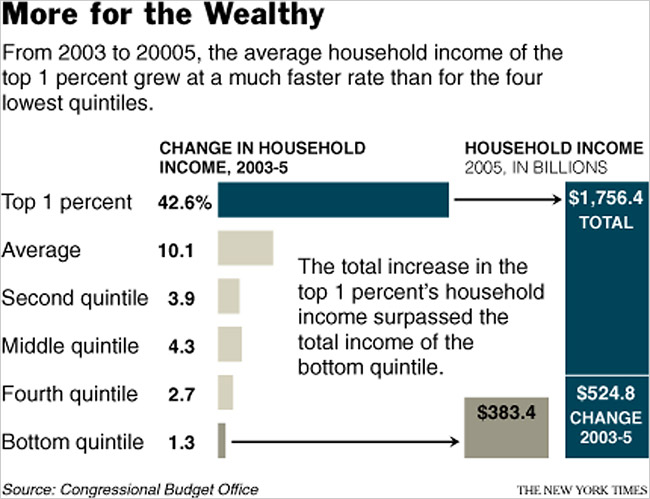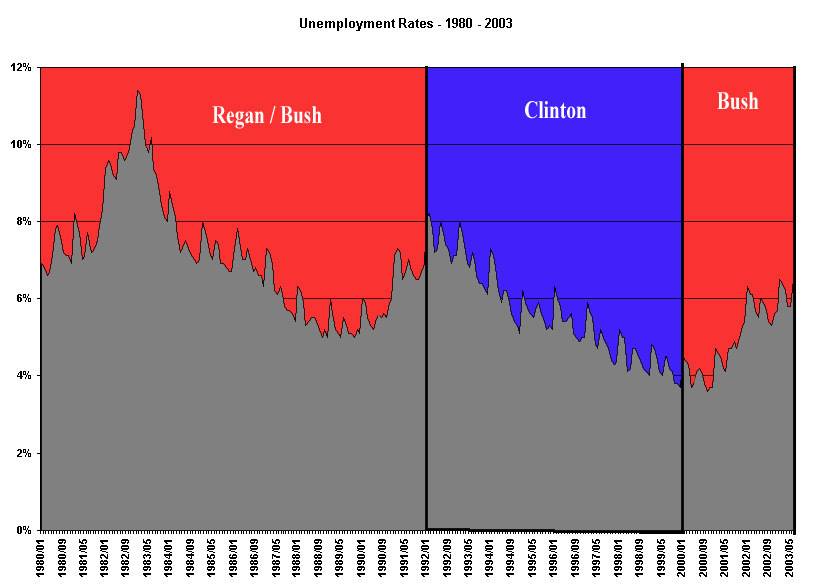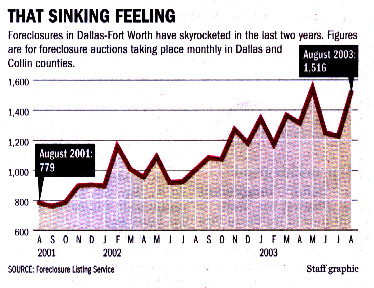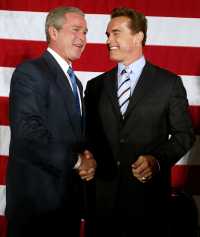Source: "Seeing an End to the Good Times (Such as They Were) " By DAVID LEONHARDT- NY Times - 3/8/08
Corporate tax revenues are now at historic low levels as a share of federal revenue, going back to the 1930s. That means individuals have a much larger share of the total tax burden.
Source: "Stupid or lying?" by Molly Ivins - Creators Syndicate - 11.15.05
The increase in incomes of the top 1 percent of Americans from 2003 to 2005 exceeded the total income of the poorest 20 percent of Americans, data in a new report by the Congressional Budget Office shows.
The poorest fifth of households had total income of $383.4 billion in 2005, while just the increase in income for the top 1 percent came to $524.8 billion, a figure 37 percent higher.
The total income of the top 1.1 million households was $1.8 trillion, or 18.1 percent of the total income of all Americans, up from 14.3 percent of all income in 2003. The total 2005 income of the three million individual Americans at the top was roughly equal to that of the bottom 166 million Americans, analysis of the report showed.
The report is the latest to document the growing concentration of income at the top,
“A lot of people justifiably feel they are working harder and smarter, they are baking a bigger and better pie, and yet their slice is not growing much at all,” [Jared Bernstein, an economist at the Economic Policy Institute in Washington] said. “It is meaningless to middle- and low-income families to say we have a great economy because their economy looks so much different than folks at the top of the scale because this is an economy that is working, but not working for everyone.”
On average, incomes for the top 1 percent of households rose by $465,700 each, or 42.6 percent after adjusting for inflation. The incomes of the poorest fifth rose by $200, or 1.3 percent, and the middle fifth increased by $2,400 or 4.3 percent.
The share of their income that the top 1 percent paid in all federal taxes and in income taxes fell. The total tax rate dropped 1.8 percentage points, to 31.2 percent, from 2003 to 2005 while their average income tax rate declined one percentage point, to 19.4 percent, largely because of the cuts in taxes on capital gains and dividends.
Source: "Report Says That the Rich Are Getting Richer Faster, Much Faster" By DAVID CAY JOHNSTON - NY Times - December 15, 2007
In 1993, President Bill Clinton raised taxes on upper-income families, the economy boomed and poverty fell for the next seven years. In 2001, President Bush cut taxes deeply, but even with economic growth, the poverty rate has risen every year since.
Source: "Liberal Hopes Ebb in Post-Storm Poverty Debate" By JASON DePARLE - NY Times - October 11, 2005
This theory, referred to as "Supply Side Economics" or more often by it's nickname "Trickle Down Economics" contends that the wealthy recipients of tax cuts will invest in businesses, which will in turn create jobs. The taxes paid by the workers who are awarded these new jobs will compensate for the revenue lost to the treasury by the tax cuts.
When the Reagan administration came to power in 1980, one of it's first acts was to decrease taxes for upper income taxpayers. Republican administrations under Reagan and Bush I implemented this theory from 1980 - 1992. Unemployment rose during that period and the federal deficit increased substantially. The recession of 81-82 was the worst since the Great Depression of the 30s
Under Clinton, from 1992-1999, marginal tax rates for the wealthy were raised, with Al Gore casting the tie breaking vote in a Senate divided along party lines. During this period, unemployment declined steadily as the deficit decreased. By the end of the Clinton administration in 1999, unemployment was lower than it had been since the 1960s. In addition, the deficit had been eliminated and the government was poised to make the first payment on the principal of the national debt since deficit spending began.
Upon seizing office in 2000, Bush II cut those same marginal tax rates. As of summer 2003, unemployment is at its highest level since 1994. Around 9 million Americans are out of work, and the economy continues to lose approximately 225,000 jobs PER MONTH. The current recession is the worst since the recession of 81-82. In addition, the government immediately reverted to deficit spending and currently is borrowing more money than at any time in history.
The resulting job losses have a ripple effect throughout the economy, such as increases in home foreclosures, etc.
Tax cuts for the rich cripple the economy by increasing government borrowing and decreasing job opportunities for working people.
On Tuesday [8/30/05], the government released data showing that for the second straight year pretax real median household income failed to grow. Meanwhile, the official poverty rate rose from 12.5 percent in 2003 to 12.7 percent in 2004. And on Friday, the Bureau of Labor Statistics reported that the economy added 169,000 jobs in August: not bad, but nothing to write home about. Do last week's figures prove that Mr. Wanniski's theory does not work as advertised? Or are there other explanations? For liberal economists, the data prove that supply-side economics has failed to deliver under Mr. Bush, just as it did when President Ronald Reagan applied it in the 1980's. Rising corporate profits and dividend payments clearly haven't trickled down into gains for people who don't own companies or stock, says Dean Baker, co-director at the Center for Economic and Policy Research, in Washington. "The wage gains," Mr. Baker said, "are concentrated in the upper-income level, just as they were in the 1980's." Nor have the reduced taxes on capital and income stimulated significant job growth. A central tenet of the supply-side creed holds that lowering taxes increases the incentives for people to work. But Mr. Baker notes that the employment-to-population ratio - the percentage of adults who are working - is still lower than it was in 2001. Mr. Baker does not predict that things will improve anytime soon.
Source: "The Supply Side vs. the Other Side" by DANIEL GROSS - NY Times - September 4, 2005
The basic hiring criterion, found in every introductory textbook (including those written by the president's own economic advisers), is straightforward: If the output of additional workers can be sold for at least enough to cover their salaries, they should be hired; otherwise not. If this criterion is met, hiring extra workers makes economic sense, no matter how poor a business owner might be. Conversely, if the criterion is not satisfied, hiring makes no economic sense, even for billionaire owners. The after-tax personal incomes of business owners are irrelevant for hiring decisions.
In brief, the president's claim that tax cuts to the owners of small businesses will stimulate them to hire more workers flies in the face of bedrock principles outlined in every introductory economics textbook.
A second way the Bush tax cuts might have stimulated employment is by inducing the wealthy to spend more on consumption. But a large share of the tax windfalls received by the wealthy are not spent in the short run. And even among those who are induced to spend more, the main effect is not increased demand for domestically produced goods and services, but rather increased bidding for choice oceanfront property and longer waiting lists for the new Porsche Carrera GT. Such spending does little to stimulate domestic employment.
Economists from both sides of the political aisle argued from the beginning that tax cuts for the wealthy made no sense as a policy for stimulating new jobs. And experience has proved them right. Total private employment was actually lower in January 2005 than in January 2001, the first time since the Great Depression that employment has fallen during a president's term of office.
Source: "Do Tax Cuts for the Wealthy Stimulate Employment?" By ROBERT H. FRANK - NY Times - July 7, 2005
Schwarzenegger isn't "The Terminator"…Bush is. Over 3 million people have been terminated at work since he came to office. (Incidentally, if the budget deficit in California is such a big deal and warrants the removal of the Governor, why is it that the budget deficit in Washington is not important and doesn't warrant removal of the President?)

Source: NY Times - 12/15/07

Source: Minnesota Workforce Center - mnwfc.org

Source: Dallas Morning News - 7/28/2003 via Forclosure Listing Service

Source: Photo by Stephen Jaffe, copyright 2003 by AFP, Getty Images, and ClariNet